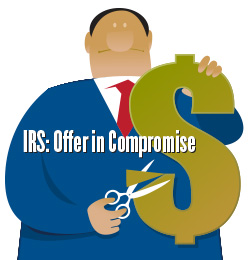Most Typical Reasons for IRS Offer in Compromise Rejection

You have been looking for a legal way to reduce your tax debt and amongst several choices, you decide to make an application for an Offer in Compromise. You have submitted a complete offer to the IRS, with all supporting documents. You feel you've taken the right step to help ease your tax burden. You feel the IRS should accept the Offer. On the contrary, you just received a formal rejection letter from the IRS notifying you that your Offer had not been accepted. You feel surprised and shocked!
The IRS usually rejects most Offer in Compromise applications for a variety of reasons; the truth is, less than 30% of all OICs submitted were accepted by the IRS. Getting a solid understanding of the reason why it was rejected might help you to find out what you must do in order to fix it. This short article will show you some insight into the most common reasons behind rejection of Offer in Compromise applications.
1. If you aren’t current
Usually, the IRS takes around 6-12 months just to process the OIC request. The IRS is not going to accept your offer should you continually add more and more to their bill during this time. You have to stay up-to-date in tax filing and payment while your offer is pending. Avoid “pyramiding” additional taxes and be up-to-date with current year tax obligations. And don't forget, the IRS Fresh Start Offer in Compromise program is not going to magically make you tax complaint or eliminate your tax debts. This is a myth!
2. You didn’t refute the IRS’s claims
The Internal
Revenue Service often miscalculates or misrepresent the figures;
approximately 25 percent of all IRS computations are incorrect. All of
us makes mistakes in their life, IRS representatives are no exception
either. In case your proposed offer in compromise is declined and if you
find any issues in calculations, you've got the right to rebut the
examiner’s reason behind rejection.
When rejected, the offer in
compromise examiner will send a rejection letter to the taxpayer and
this letter will explain the reason why the internal Revenue Service
declined your offer. But often taxpayers overlook any errors made by the
examiner when computing Reasonable Collectible Potential (RCP) or will
accept the letter plainly without taking any new action.
3. You didn’t substantiate
An Offer in compromise (OIC) is a legal claim where every tiny shred of evidence counts towards the approval of your offer. An Offer in Compromise is completely unlike a income tax return , which will likely never get scrutinized by a actual human being. Tax returns are assumed to be correct, and only where there is a numerical difference between say a 1099 reported and a 1099 as claimed (or not claimed) will the IRS reach you (typically accompanied by a Letter CP 2000).
Having said that, it's quite the opposite with Offers in Compromise applications. There will definitely be an OIC Examiner who will not only audit your earnings, but also your property and assets. Be ready for that.
4. You didn’t appeal
Individuals presume that the IRS is invariably correct and will take the IRS rejection letter as final however, this is not the end of the road. You have the right to appeal and get your offer reconsidered by supplying adequate information to prove that the IRS verdict was wrong! Carefully assess the factors behind rejection and just what you can do to bolster your position so you can get a favorable result from the IRS Office of Appeals division.
IRS Fresh Start Initiatives: Does It Help You?

Announced in Feb 2011, the IRS Fresh Start Program has got one aim; to assist tax payers who are finding it hard to pay their back taxes. The new policies were meant to lower the number of tax liens issued and also to help more people qualify for installment agreements and offer in compromise. But are these new rules on the already established programs really going to lessen the taxpayers’ difficulty in repaying their back taxes? Let’s figure out.
Federal Tax Liens
The first program is the IRS Fresh Start Federal Tax Lien program. The Internal Revenue Service promises that the new rule for Federal Tax Lien filing is in taxpayers' favor since it has raised the minimal liability for filing a tax lien from $5,000 to $10,000; sounds good. However, this is pretty useless. And what's there for the IRS to obtain something from individuals when they do not have anything to pay money for? It'll just ding the credit rating by 100 points or higher making it hard to get approved for new credit to repay the IRS. The IRS has filed liens even when it costs the government greater expense to submit the tax lien than it could actually collect. Rating: Two Thumbs down, flabby, over-rated, and ineffective.
Program #2: IRS Fresh Start and Installment Agreements
The next program is the IRS installment payment plans. In the event you owe $50,000 or fewer in combined tax, interest, and penalties, you can take part in an installment plan by providing minimum financial information to the IRS (in case you owe fewer than $25,000 you don't have to provide anything). The time-line for repaying under the streamlined installment agreement has been increased to 72 months. Once 2-3 months of direct debit payments have been made, the taxpayer can demand to have the tax lien removed. Rating: Good. Should you owe over $50,000, you need to submit Form 433-F, the Collection Information Statement. You have do a great deal of negotiations with the Internal Revenue Service over a affordable regular monthly plan since the payment amounts are at the sole discretion of the IRS employees.
IRS Fresh Start and Offer in Compromise
This is definitely the best IRS Fresh Start program to get rid of debts for a lot less than the amount owed. The Internal Revenue Service has now set up more flexible standards in evaluating the financial ability of individuals who ask for relief under the OIC program. The most important change is with the calculation of the taxpayer’s “reasonable collection potential” under the future income component. It really works this way: Instead of multiplying the discretionary income amount by 48 or 60, it'll be multiplied by 12 or 24, correspondingly. As per the new rules, the IRS allows people with annual income as much as $100,000 to take part in OIC program. For that reason, more individuals may qualify. My rating: Excellent - Two thumbs up.
The issue is getting the IRS to follow its own IRS Fresh Start Initiative rules
The Internal Revenue Service Fresh Start program does provide a viable opportunity to resolve back tax problems, however, this does not mean that these options represent an easy solution. Requesting an installment agreement or submitting an offer in compromise is a kind of a lawsuit claiming that your ability to pay income taxes is limited. Thus, you need to approach it like a legal case that you want to succeed. There is no guarantee that the new relaxed policies will stay for a long time, so there is no better time than now to start off negotiating with the IRS. Here's where a tax law firm can play a significant role. He / she will deal with the IRS on your behalf and assist you to leverage the Fresh Start programs to considerably reduce your overall tax burden.
How And When The IRS Debt Forgiveness Programs Could Solve Your Back Taxes Problems?

Are you aware close to one million Americans owe the government in back taxes? Now the follow up question: If so many people owe the back taxes, how will the IRS ever going to collect it from all those tax payers? Now, here is the IRS’s best kept hidden secret - they've established quite a few tax debt forgiveness programs to provide relief for taxpayers who are living with overwhelming amount of tax debts. The next few paragraphs will explain to you the 3 forces which makes the IRS to forgive your tax debts and then a little bit details about the major IRS tax forgiveness programs.
3 things which will put pressure on the Internal Revenue Service to forgive tax debts
Time limit on IRS tax debt collections: You owe IRS money and you are aware that IRS collection measures can be scary but did you know that you won't be on the hook permanently? Yes, the Internal Revenue Service must adhere to statute of limitations that put a time frame to collect your unpaid taxes. Once the statute runs out, your liability too expires and also the IRS's legal right to carry out collection attempts. So, instead of waiting for ten years only to get X amount of dollars, what if you offered X $1 to the IRS to settle back taxes? Will the IRS gets a good deal from this? Will it benefit you? Yes, it may be.
Blood from a Stone: If you don't have hardly any money to pay for, would any form of collection action benefit the IRS? The Internal Revenue Service might say you owe tens of thousands of dollars, but so what? Why not make it a million? There isn't any difference should you have very little money to pay out. In technical terms the “Blood from a Stone” rule translates into IRS-speak as Realistic Collection Potential (RCP). If you're dead broke, have no assets, your RCP is $0.
Bankruptcy: Under certain circumstances, Chapter 7 bankruptcy could stop all of the IRS collection efforts as well as fully eliminate personal tax debts. That means, the IRS could get ZERO DOLLARS, even if you owe millions of dollars in back taxes. Your tax debts forgiven and a "fresh start" granted - allowing to start over a new life free from IRS levies and liens.
IRS Tax Forgiveness
Now, let’s analyze the 3 common programs of IRS debt forgiveness currently available.
IRS Hardship Program
Should your RCP is really low and any assets you've got aren’t worthy of anything or you can’t gain access to them, you might be able to be eligible for Currently Non Collectible (CNC). CNC means that the IRS will halt any collection action and you don't need to make any payment until your position improves, aside from responding to any on-going underpayment situation. CNC will run the clock, so that should you remain in CNC for the entire duration of the Statute of Limitations, you might pay for the IRS nothing.
Doubt as to Collectability Offer in Compromise
There are three types
of Offer in Compromise exist, but Doubt as to Collectibility offers are
the most common type utilized for tax debt forgiveness. The other two
types of OICs are seldom used. It is based upon your ability to repay
the IRS opposed to the IRS's power to collect. At IRS Medic, we have a
high rate of success of lowering our client's tax debts through this
program.
Using Partial Payment Installment Agreement
It is another tax debt reduction plan that you could qualify if your RCP is too high to apply for CNC status. Under this program, you need to pay the IRS “something” that you can afford in installments. Just like CNC, the collection clock continues to tick for PPIA also; you need to pay till the statute runs out. After that period of time, regardless of what the balance amount that you've not settled would be permanently forgiven.
The Internal Revenue Service has understood that collecting back taxes in excess of what the tax payer could afford to pay for is not realistic. So either they forgive the tax debt partially for individuals who are eligible for IRS reduction programs or fully for individuals who have any ability to shell out toward their back taxes. They offer this not out of heart of compassion towards the struggling taxpayers. The key is to offer hope and bring them back as productive, taxpaying citizens.
Make Use Of These Four Tips to Maximize the Likelihood of Getting Your Offer in Compromise Accepted
.jpg)
An Offer in Compromise program is a great way to resolve a tax debt with the Internal Revenue Service. However, the vast majority of taxpayers who sought for a compromise either obtained a rejection or they land up paying a large amount of money to the Internal Revenue Service. The article will talk about four OIC tips that will let you find light at the end of the tunnel for your tax issues and also help save thousands of dollars when repaying the debt.
OIC Tip #1 Actual expenses vs. IRS standard expenses
Preparing your Offer in Compromise centered only on the actual expenses probably won't yield the desired outcomes. You should know when the IRS allows an individual to claim expenses above the maximum limit and when they won't. Where maximum permitted expenses are exceeded or when arguing actual expenses, you must provide documentation and reasons for why implementing national and local expense standards are inadequate for you personally. Understand that not all expenses have to be indispensable to be considered necessary. Additionally know when to use the IRS standards for calculating expenses because it sometimes can be more beneficial than utilizing actual expenses.
OIC Tip 2: Reduce equity in assets
Don’t emphasize your assets. Take full advantage of every available tax break opportunity and know the way to write-off the majority of your expenses. Discover the intricacies when claiming mileage deduction or calculating depreciation of vehicles. Evaluate the deduction using the actual expense method and standard mileage rate to find out which will offer best tax result for you. Funds placed in retirement account are considered an asset and would be evaluated for offer purposes. Study the limits of liquidating or taking up funds from retirement account and understand how converting the equity into an future stream of income can benefit the individual.
Offer in Compromise Tip 3: Utilize the Collection Statute Expiration Date (CSED) to your advantage
Depending on how much time you have to go before the CSED, pursuing the Statute of Limitations as leverage might work to your advantage. If your liability is near to expiring soon, the internal revenue service might highly prefer approving your Offer in Compromise rather than gambling on should they recover the outstanding taxes through a monthly payment plan.
OIC Tip #4 Don’t hesitate to appeal if your offer is rejected
Obtain the copies of collection's Income/Expense Table and also the Assets/Equity Table from the IRS in the event your offer was declined. Read the computations and if you see anything that is incorrect and arguable, you will have the right to fight them by submitting an appeal. If you feel the assets value is not correct, argue them with the current appraisals. If the expense or income is in dispute, produce supportive documentation to prove your point. If the Offer isn't accepted, there are other alternative solutions available which you can get through appeal.
In conclusion: Prepare an OIC with caution
Getting the Offer in Compromise approved is usually a more complicated avenue to pursue. These Offer tips are only a standard outlines and there are certainly more tricks of the trade. Taxpayer representing their case themselves can turn out to be more costly over the long run. Plus there are actually negative outcomes when submitting an inappropriate OIC. Additionally, there might be a better solution for you personally. A professional representation from a tax attorney really helps to make sure that your offer in compromise receives a better chance of being processed and accepted.
Offer in Compromise and the IRS: The Most Common questions answered

In the following paragraphs, we will be addressing the most typical
questions and concerns of citizens about the IRS Offer in Compromise.
Let us keep the legal analysis to a minimum and try to use regular
language.
Offer in Compromise - Is it a fraud program?
It
is real. But some rip-off firms utilized the IRS Offer in Compromise
program as a tool to scam people by assuring them to settle their debt
for less. While the major tax settlement companies are been recently
shutdown by government authorities, some small companies are still there
that continue to publish advertisements and send out junk emails to
people with tax liens. Honestly, they are really obnoxious and the
Internal Revenue Service does little to regulate them.
A lot of
Offers in Compromises failed to benefit people because of either: a)
they paid an inexperienced tax company (who'll do nothing except cashing
on hefty fees) to represent them or b) they are not just qualified for
an Offer in Compromise And some of those people may have even qualified
for a better deal with the IRS.
Will the Internal Revenue Service really keep my refunds when my offer in compromise gets accepted?
The
IRS can keep tax refunds, including any interest due for periods
extending through the calendar year the IRS approves an Offer in
Compromise.
What will happen to an OIC and IRS tax lien?
The
Internal Revenue Service will release the federal tax lien, when all
payment terms of the OIC are satisfied. This procedure usually takes
around two months to complete.
Could I submit an Offer in Compromise myself?
Submitting
an OIC form and submitting a 1040 tax form are two completely different
things. The vast majority of Offer in Compromise applications either
may get rejected or returned as “unprocessable” by the IRS. Preparing an
Offer in compromise is often a lengthy and overwhelming process,
additionally, the IRS will challenge whatever you say. Remember, this is
actually the form where you need to give all the information about your
earnings, assets and expenses.
Just how much should I offer?
Obviously, individuals want to pay as little as possible to settle their debts. But the amount will be based upon your reasonable collection potential (RCP).
Your RCP will be the magic number. Now your question is, “What number I
need to put down in the OIC form 656? " It is difficult to answer since
there are several aspects to consider. It is best to leave this task in
the hands of a skilled tax professional as they are the ideal persons
to find out the minimum amount which gets accepted by the IRS.
The other things I need to know about IRS Offer in Compromise
Right
after acceptance of an Offer, one needs to comply with federal tax
filing and payment requirements for a period of five years. Failure to
do this can result in OIC being declared as default and all your tax
debts will come back.
Can a running company file an Offer in Compromise?
Normally, an individual taxpayer will look for relief under Offer in Compromise
program but a company who owe back payroll taxes may also be entitled
to this program. But the procedure is lot more challenging and in order
to strike a deal, they have to get professional guidance from a tax
practitioner.
Is It possible to file an Offer in Compromise on trust fund taxes?
Yes, you can actually negotiate trust fund recovery penalties with an OIC.
How to Get the Internal Revenue Service to Accept your Offer in Compromise?

Getting your Offer in Compromise accepted isn't really an automatic procedure. It's tricky; It is an art form, but it is achievable. Oh, it is.
No one could be able to write an article regarding how to guarantee your Offer in Compromise to get accepted. Our lawyers doesn't guarantee that to our valued clients because it is not possible at all times. Having Said That, what I can do is let you know about the actions to take in this post to maximize the likelihood of getting the IRS Offer in Compromise accepted.
Did you fully paid the required taxes you owe till date? If self-employed, do you made your entire every quarter estimated tax payments properly? For W -2 workers, your company is required to make pay-roll tax payments to the federal government and also need to file proper reporting and informational returns. Otherwise, your OIC will not be considered as you failed to comply with the tax guidelines.
You need to have filed all the tax returns. Simply wanting to make a deal with the IRS is not good enough . To be eligible for Offer In Compromise consideration, you have to clearly show the IRS that your meet the criteria for the process. You must be compliance. Compliance usually means you do things the way that they show you (which is of course tough, particularly when you cannot fully grasp them).
You need to send all the supporting files to authenticate the case. Always handle the IRS without sounding rude since shouting at them or becoming emotional won't help you by anyway.
The Internal Revenue Service charges a user fee to process an Offer in Compromise. If you don’t send in your fee or fee waiver, the government can't process your Offer.
Did you tell the truth? The Offer Investigators will check all that you say. When the IRS detects any fraudulent details on your report, your offer as well as other requests will get entirely declined. And just like a tax return, it is a Federal felony to lie on an IRS Offer in Compromise form or any other collection information statement.
Have you been being polite and respectful to the IRS Offer in Compromise Examiner? Nothing makes matters more serious if you address IRS authorities in a rude, upsetting manner. The result will be better if you're respectful and friendly to the authorities, recognizing that he / she is simply trying to do the job. But going too far by being very nice to them is going to be viewed as suspicious. Whenever they make inquiries, reply directly and to the point. You should always be 100% well prepared before you carry out the negotiation with the Internal Revenue Service, considering that any bad reply from you can increase the risk of rejection of your OIC.
When The Offer In Compromise Won’t Be An Ideal Resolution For One's Tax Debts

An Internal Revenue Service Offer in Compromise program is the one resolution that can give hope to a taxpayer when he got an outstanding tax debt. Indeed, we cannot hide the reality that several tax relief companies like RoniDeutch, American Tax Relief and Taxmaster failed to run their firm successfully because they aren't able to execute their guarantees with results, but do not get dejected because of this. The OIC program is a wonderful way to remove taxes owed behind you forever.
One among things you must consider though - is the IRS isn't stupid. They really aren't going to settle for less on the grounds that you requested them to or hired a tax attorney to negotiate in your case. Their greatest objective would be that the offers are in the best interest of the tax system. Here the tax lawyer has a major role in persuading the IRS to prove it is to their best interest.
That being said, can you believe there are scenarios where by it isn't to your best benefit to file for an offer in compromise? Indeed, it's true. And listed here they are…
1. If you have old taxes so you were planning on declaring bankruptcy.
Would you believe that you can file Chapter 7 bankruptcy to completely clean -out old individual tax liabilities? So why bother paying out even a nickel to the Internal Revenue Service is you can walk away without having to pay anything at all. I see adverts from national tax so- called relief companies who state that Chapter 7 isn't a good idea. But, the hidden fact is these companies cannot get good money once you for personal bankruptcy. My firm does not file bankruptcy, and so we do not have a dog in the battle, we would like to assist clients in getting the very best resolution even when there is no cash involved for us. Certainly, this makes us busy enough.
2. Offer in Compromise and the tax laws compliance
Several do not know that whenever IRS accepts your Offer in Compromise, IRS can expect the tax payer to be fully adhering to the tax law. Following acceptance, the citizen have to file returns and pay out his taxes on time for period of five years. Failing to do this, your OIC will be announced default and be ready to pay back all outstanding tax dues with interest. Of these situations, we will formulate other choices for our valued clientele to deal with their past due taxes.
3. For those who have submitted previous Offers in Compromises without success.
Quite a few people believe that submitting many OIC helps to get it accepted. However it's not. Only rejection occurs. Same thing could happen when the amount you offered is not that competitive. To get your offer okayed, you need to come up with a tale based on truth and also taking advantage of some of the unknown rules and exceptions which combinedly encourages the IRS employee to consider your proposal. In case you overlook this, be prepared to see denial of one's offer.
The IRS only has 10 years to collect the tax owed, after that they no longer can claim the debt plus they write it off. There are things that halt the time from ticking. One particular event is the filing an OIC. This is known as as tolling the statute of limitations. Assume your tax return was filed for the financial year 2001 on time. Your taxes got evaluated on April 15, 2002 where there had been some past due tax dues. If you did nothing to halt the clock, the internal revenue service simply cannot recover your tax debts on or right after April 16, 2012. Yes !, this means you owe absolutely nothing now.
Do not forget that the filing of an Offer in Compromise will stay the ten- year statute of limitations on collection for a period of the offer plus 1 year. I know of a case where a individual submitted six offers in compromise for taxation's for the year 2002. This could possibly make the statute of limitations longer than 10 years this means the government has time until the calendar year 2018 to collect this debt. By today, this tax payer will be free of his tax financial obligations if he didn't opted for an OIC.
4. Taking advantage on the Statute of Limitations
Now think about looking this case in an alternate angle- Let's assume that attorney filed 1040 by due date for 2002 year taxes. And he never gone for any solutions that can toll the time from running. Currently, the whole tax debts that added up with penalty charges is$ 250,000. Should Really he file an offer?
It certainly won't be. The truth is Internal Revenue Service has only seven months to claim that tax payments. In case the lawyer make the IRS accept partial repayment of$ 1000 a month, then by Apr 2013, the taxpayer owes absolutely nothing. So instead of offer in compromise, by opting installment agreement he only will pay back 7000 dollars of his$ 250,000 tax arrears. Certainly there exists a disadvantage. With this strategy the tax lien would not get released or totally removed. On the other hand, a accepted OIC that settles tax financial obligations will likely be detailed as " paid in full " on credit reports.